

Booked #3: What Exactly is Neoliberalism? Booked is a monthly series of Q&As with authors by Dissent contributing editor Timothy Shenk.
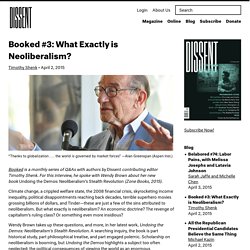
For this interview, he spoke with Wendy Brown about her new book Undoing the Demos: Neoliberalism’s Stealth Revolution (Zone Books, 2015). Climate change, a crippled welfare state, the 2008 financial crisis, skyrocketing income inequality, political disappointments reaching back decades, terrible superhero movies grossing billions of dollars, and Tinder—these are just a few of the sins attributed to neoliberalism. But what exactly is neoliberalism? An economic doctrine? The revenge of capitalism’s ruling class? Wendy Brown takes up these questions, and more, in her latest work, Undoing the Demos: Neoliberalism’s Stealth Revolution. —Timothy Shenk Timothy Shenk: You note early in Undoing the Demos that while references to “neoliberalism” have become routine, especially on the left, the word itself “is a loose and shifting signifier.”
The Necessity of Disorder in a Soft City: De Certeau vs Foucault (Part I) » Sociology Lens. Hear Michel Foucault's Lecture "The Culture of the Self," Presented in English at UC Berkeley (1983) Michel Foucault’s time in the United States in the last years of his life, particularly his time as a lecturer at UC Berkeley, proved to be extraordinarily productive in the development of his theoretical understanding of what he saw as the central question facing the contemporary West: the question of the self.
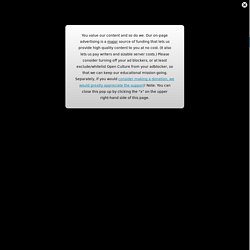
In his 1983 Berkeley lectures in English on “The Culture of the Self,” Foucault stated and restated the question in a variety of ways—“What are we in our actuality? ,” “What are we today?” —and his investigations amount to “an alternative to the traditional philosophical questions: What is the world? What is man? Keith Ansell-Pearson. I joined Warwick's Philosophy Department in 1993, having previously taught at Queen Mary College of London University (1988-93) and the University of Malawi (1985-7).
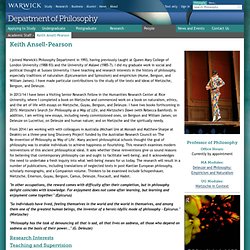
I did my graduate work in social and political thought at Sussex University. I have teaching and research interests in the history of philosophy, especially traditions of naturalism (Epicureanism and Spinozism) and empiricism (Hume, Bergson, and William James). I have made particular contributions to the study of the texts and ideas of Nietzsche, Bergson, and Deleuze. In 2013/14 I have been a Visiting Senior Research Fellow in the Humanities Research Center at Rice University, where I completed a book on Nietzsche and commenced work on a book on naturalism, ethics, and the art of life with essays on Nietzsche, Guyau, Bergson, and Deleuze. Is governmentality a dirty word? What difference, I wonder, has the publication in English of Foucault’s lecture course on The Birth of Biopolitics, which aren’t, after all, actually about biopolitics, made to ‘hegemonic’ theoretical accounts of the rise and spread and future of neoliberalism?
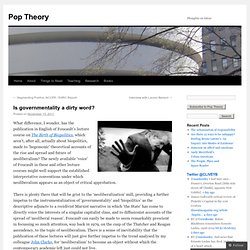
The newly available ‘voice’ of Foucault in these and other lecture courses might well support the established interpretative conventions under which neoliberalism appears as an object of critical approbation. There is plenty there that will be grist to the ‘neoliberalization’ mill, providing a further impetus to the instrumentalization of ‘governmentality’ and ‘biopolitics’ as the descriptive adjuncts to a recidivist Marxist narrative in which ‘the State’ has come to directly voice the interests of a singular capitalist class, and to diffusionist accounts of the spread of ‘neoliberal reason’. Is Foucault criticizing neoliberalism in these lectures? Is this just a 70s thing? What has critique got to do with governmentality? Pourquoi Michel Foucault est partout. En 1979, dans le cadre de son cours hebdomadaire au Collège de France, Michel Foucault consacre trois séances à la théorie néolibérale.
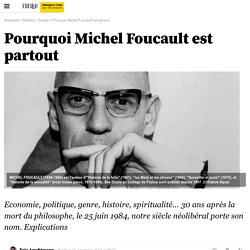
Il y analyse des auteurs peu connus en France: les économistes allemands de l'après-guerre, l'Autrichien Friedrich Hayek ou encore l'ultralibéral américain Gary Becker, futur prix Nobel d'économie. Avec un sens stupéfiant de l'anticipation, il dévoile le véritable projet de ce courant de pensée: officiellement, le néolibéralisme prétend «libérer» les individus et leur permettre d'agir à leur guise; en réalité, explique le philosophe, il s'agit d'imposer une façon de vivre entièrement guidée par l'intérêt et le calcul économique.
Le marché n'est pas un mécanisme naturel, mais un dispositif, une «discipline», une «technique de gouvernement», comme la prison ou l'hôpital psychiatrique. Le néolibéralisme fabrique Homo economicus de la même manière que la clinique fabrique le fou. A l'époque, la question n'intéresse guère. De Chakrabarty à... Eric Aeschimann.